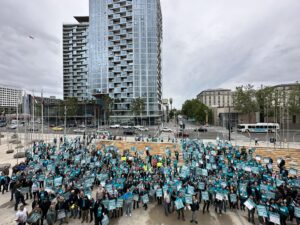This past week, the Asian Pacific American Labor Alliance (APALA) held its 13th Bi-Annual Convention in San Diego.
APALA is the first and only national organization of Asian Pacific American (APA) union members. Founded in 1992, APALA strives to build a bridge between all APA union members throughout the country and to the broader labor movement. There are over 660,000 APA union members across the United States.
In the Bay Area, APA make up a significant number of IFPTE Local 21 membership.
IFPTE President, Greg Junemann, spoke at the convention concerning the future of the labor movement. L21 also sent delegate staff and member representatives. One L21 member, Nancy Au-Yeung, an engineer at the San Francisco Public Utilities Commission, participated at the convention.
“It was fun to meet fellow members and union reps to learn about what they do and what we are a part of, how we fit in, the benefits of being organized and the strength of a union. It was great to see other people being so passionate about the labor movement, arguing for workers’ benefits, and fighting against corporate greed,” Nancy said.
Nancy recalled one hot topic at the convention: the on-demand economy. “I learned about many arguments against businesses like Airbnb, Uber, and Lyft, who are bypassing background checks, insurance, proper licensing, city taxes, etc. that traditional hotels and taxi companies are all bound by,” Nancy said. “This decreases public safety and hurts cities’ economies. We heard from taxi drivers and neighbors of Airbnb homes who are negatively impacted by these new businesses.”
While APALA supports small homeowners renting out a room to help pay the bills, this type of arrangement only comprises 30% of Airbnb accommodations. The other 70% include companies that are buying out entire buildings and leasing out all units on Airbnb, without actually living in the units themselves.
Nancy noted that APALA argues for Uber and Lyft drivers to unionize so they can receive proper compensation, benefits, and protection as part-time and often over-time workers.






